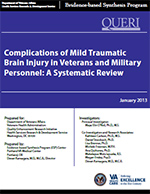
|
Principal Investigator:
Maya Elin O'Neil, Ph.D., M.S. Evidence-based Synthesis Program (ESP) Center
Portland VA Medical Center
Washington (DC): Department of Veterans Affairs; January 2013 |
Download PDF: Complete Report, Executive Summary, Report, Appendices
Traumatic brain injury (TBI) is a common condition, especially among military members. Twelve to 23 percent of service members returning from Operations Enduring Freedom, Iraqi Freedom, and New Dawn (OEF/OIF/OND) experienced a TBI while deployed. Although various criteria are used to define TBI severity, the majority of documented TBI events among OEF/OIF/ OND service members may be classified as mild in severity, or mTBI, according to the definition used by the Veterans Health Administration and Department of Defense (VA/DoD).
While some researchers suggest most individuals recover within three months of an mTBI, others estimate that 10 to 20 percent of individuals continue to experience post-concussive symptoms (e.g., headaches, dizziness, balance problems) beyond this time fame. This estimate may be higher among OEF/OIF service members given the frequency of multiple TBI events, concomitant mental health conditions such as depression and posttraumatic stress disorder (PTSD), and other factors unique to combat deployments. As such, deployment-related mTBI is a significant issue for the VA, as patients who report ongoing mTBI symptoms may require the attention from a range of health care professionals. This evidence synthesis review will be used by the VHA TBI Advisory Committee to develop strategies to identify those at-risk for long-term mTBI effects, inform clinical practice, determine resource allocation, and identify future research priorities.